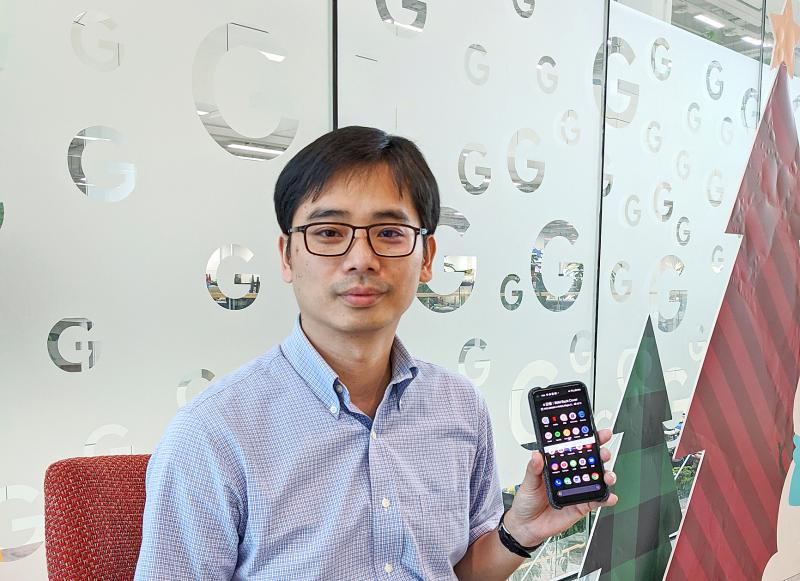Google is planning to pour more funds into its hardware development team in Taiwan to seek a bigger market share for its line of Pixel smartphones in the competitive global market.
In a recent interview with the Central News Agency, Google vice president of hardware Elmer Peng (彭昱鈞) said that although Pixel models account for only a small fraction of the global smartphone market, Google is determined to strengthen its handset operations in Taiwan to roll out better products to attract more consumers.
In 2018, Google spent US$1.1 billion to acquire HTC Corp’s (宏達電) cellphone original design manufacturing assets, which had rolled out the Pixel line for the US client.

Photo courtesy of Google
HTC also transferred 2,000 engineers to work for the US tech giant and as a result, the team has continued to work on the Pixel for Google.
Peng, who was one of the engineers transferred to work for Google, used to be a vice president at HTC, responsible for developing a wide range of technologies such as audio and image applications.
At Google, he shoulders the responsibility of Pixel development.
The Pixel models represent Google’s own interpretation of an Android phone, which is able to integrate all of the services Google can provide, Peng said.
While the Taiwanese team is in charge of developing the Pixel, Google is a multinational company and the Pixel’s development requires more cooperation with Google’s US headquarters, as well as effective and efficient international coordination with its suppliers and many others to make a better smartphone, he said.
“I am sure that Google will continue to invest in the Taiwan hardware team as talents in the team are always able to come up with good and precise product ideas, and carry out their business plans well,” Peng said.
Google has set sights on grasping a larger share in the global smartphone market by improving its Pixel line, he said.
“Although the global smartphone market has been saturated, I believe as long as Pixel is able to appeal to as many consumers as possible, Google will achieve the goal of selling more smartphones,” he added.
Citing the newly unveiled 5.81-inch Pixel 4a as an example, Peng said that the model, taking advantage of a special design in its casing weighs only 143g, which allows users to hold and use the device more easily.
Google is planning to launch its first 5G smartphone models — the Pixel 4a (5G) and Pixel 5 — later this year.
Peng said the Google phones would work well under the current 5G era.

UNCERTAINTY: Innolux activated a stringent supply chain management mechanism, as it did during the COVID-19 pandemic, to ensure optimal inventory levels for customers Flat-panel display makers AUO Corp (友達) and Innolux Corp (群創) yesterday said that about 12 to 20 percent of their display business is at risk of potential US tariffs and that they would relocate production or shipment destinations to mitigate the levies’ effects. US tariffs would have a direct impact of US$200 million on AUO’s revenue, company chairman Paul Peng (彭雙浪) told reporters on the sidelines of the Touch Taiwan trade show in Taipei yesterday. That would make up about 12 percent of the company’s overall revenue. To cope with the tariff uncertainty, AUO plans to allocate its production to manufacturing facilities in

Taiwan will prioritize the development of silicon photonics by taking advantage of its strength in the semiconductor industry to build another shield to protect the local economy, National Development Council (NDC) Minister Paul Liu (劉鏡清) said yesterday. Speaking at a meeting of the legislature’s Economics Committee, Liu said Taiwan already has the artificial intelligence (AI) industry as a shield, after the semiconductor industry, to safeguard the country, and is looking at new unique fields to build more economic shields. While Taiwan will further strengthen its existing shields, over the longer term, the country is determined to focus on such potential segments as

TAKING STOCK: A Taiwanese cookware firm in Vietnam urged customers to assess inventory or place orders early so shipments can reach the US while tariffs are paused Taiwanese businesses in Vietnam are exploring alternatives after the White House imposed a 46 percent import duty on Vietnamese goods, following US President Donald Trump’s announcement of “reciprocal” tariffs on the US’ trading partners. Lo Shih-liang (羅世良), chairman of Brico Industry Co (裕茂工業), a Taiwanese company that manufactures cast iron cookware and stove components in Vietnam, said that more than 40 percent of his business was tied to the US market, describing the constant US policy shifts as an emotional roller coaster. “I work during the day and stay up all night watching the news. I’ve been following US news until 3am

COLLABORATION: Given Taiwan’s key position in global supply chains, the US firm is discussing strategies with local partners and clients to deal with global uncertainties Advanced Micro Devices Inc (AMD) yesterday said it is meeting with local ecosystem partners, including Taiwan Semiconductor Manufacturing Co (TSMC, 台積電), to discuss strategies, including long-term manufacturing, to navigate uncertainties such as US tariffs, as Taiwan occupies an important position in global supply chains. AMD chief executive officer Lisa Su (蘇姿丰) told reporters that Taiwan is an important part of the chip designer’s ecosystem and she is discussing with partners and customers in Taiwan to forge strong collaborations on different areas during this critical period. AMD has just become the first artificial-intelligence (AI) server chip customer of TSMC to utilize its advanced